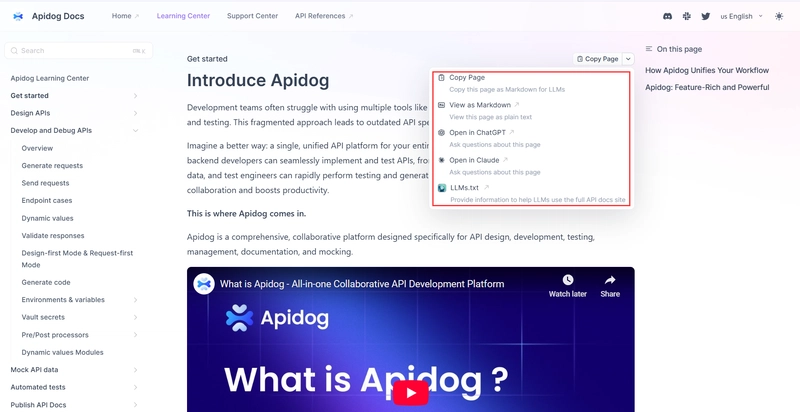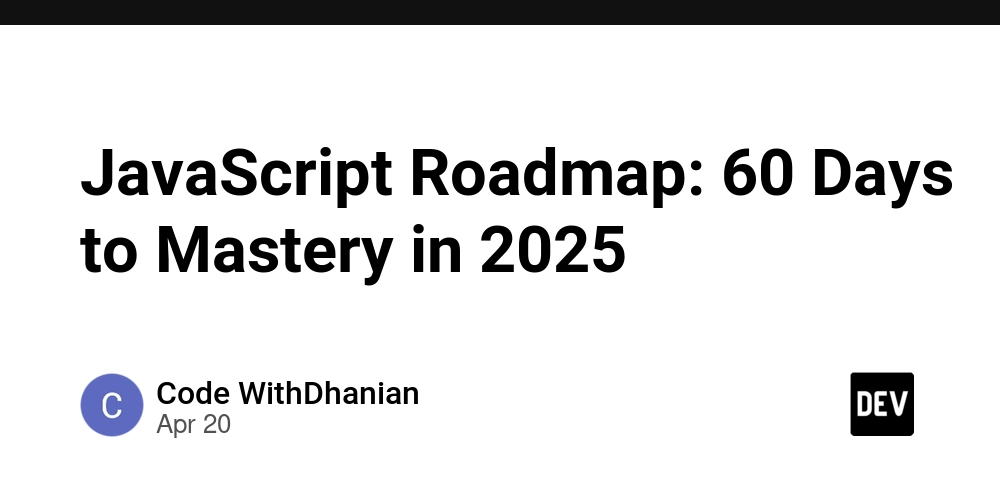Everyone’s Talking About LLMs.txt. Here is What I Experienced:
As a developer working with APIs daily, I've found that large language models like ChatGPT and Claude have become indispensable tools in my workflow. However, I've constantly faced a frustrating challenge: when these AI assistants try to read API documentation, they get bogged down by HTML, JavaScript, and CSS that's irrelevant to understanding the actual API. This "noise" creates two practical problems in my development process: It wastes my context window when sharing documentation with AI It burns through tokens unnecessarily, increasing costs The LLMs.txt Solution: What It Means for Developers When I discovered Jeremy Howard's LLMs.txt standard (proposed in September 2024), I immediately recognized its value. The concept is brilliantly simple: Every webpage offers a clean Markdown version by adding .md to the URL A central LLMs.txt file in the root directory maps all available Markdown pages As a developer, I think of this as "sitemap.xml for AI" - it's essentially SEO optimization for our AI coding assistants rather than search engines. Why the Technical Implementation Matters to My Workflow The technical foundation of LLMs.txt directly addresses a limitation I encounter daily: AI context windows are too small to process entire documentation sites with all their markup and scripts. When examining the standard format for an LLMs.txt file, I appreciate its developer-friendly structure: H1 heading with the project name (required) Blockquote with a concise project summary Additional context about the project H2-delimited sections with URL lists for further details This structure makes it easy for both me and my AI tools to navigate documentation efficiently. Real Development Benefits I've Experienced In my development work, LLMs.txt has delivered two core benefits that have measurably improved my productivity: 1. More Precise Documentation Understanding When I need to understand a complex API, having the AI parse clean Markdown instead of HTML has resulted in: More accurate interpretation of endpoint specifications Better understanding of parameter requirements Clearer comprehension of authentication flows Reduced token usage in my AI conversations This precision is crucial when I'm working with complex APIs where misunderstanding even small details can lead to hours of debugging. 2. More Reliable Code Generation The most valuable improvement I've seen is in code generation. When my AI assistant can accurately understand API definitions, it generates much more reliable code: Request implementations that correctly handle all parameters Data models that properly reflect API schemas Integration code that properly handles authentication and errors Test cases that thoroughly validate API interactions This capability has dramatically accelerated my development cycles by reducing the manual coding required for API integrations. How I Use Apidog's LLMs.txt Support in My Daily Work As a developer who regularly works with Apidog, I was thrilled when they launched full support for the LLMs.txt standard. Their implementation has become an essential part of my workflow. Here's how Apidog's LLMs.txt support has changed my development process: Markdown Access for Quick Reference: When I need to understand an API endpoint, I simply add .md to the URL. This gives me a clean version I can quickly scan or share with AI. One-Click Copy for AI Assistance: The "Copy page" button has become one of my most-used features. I can grab the Markdown content of any page with a single click and paste it directly into my AI chat. Automatic LLMs.txt Generation: I don't have to worry about maintaining anything - the system automatically generates the LLMs.txt index for my documentation sites. Try out Apidog's LLMs.txt Now! My Practical Development Workflow with Apidog's LLMs.txt Here's how I've integrated Apidog's LLMs.txt support into my daily development routine: When I'm Exploring a New API When I encounter a new API in Apidog documentation, I: Add .md to the URL (e.g., https://apidocs.example.com/users.md) Share this URL with my AI assistant that has browsing capabilities Ask specific questions like: "What parameters are required for the create user endpoint?" This approach gives me immediate insights without having to manually parse the documentation. When I'm Implementing an API During implementation, my workflow typically looks like: Click the "Copy page" button in Apidog to grab the Markdown version Paste it into my AI chat Ask for specific implementation help: "Generate a TypeScript client for this user management API with proper error handling" This process has cut my implementation time by at least 50% on most projects. Developer-to-Developer: Why This Matters for Your Projects From one developer to another, here's why Apidog's LLMs.txt support has made a tangible difference

As a developer working with APIs daily, I've found that large language models like ChatGPT and Claude have become indispensable tools in my workflow. However, I've constantly faced a frustrating challenge: when these AI assistants try to read API documentation, they get bogged down by HTML, JavaScript, and CSS that's irrelevant to understanding the actual API.
This "noise" creates two practical problems in my development process:
- It wastes my context window when sharing documentation with AI
- It burns through tokens unnecessarily, increasing costs
The LLMs.txt Solution: What It Means for Developers
When I discovered Jeremy Howard's LLMs.txt standard (proposed in September 2024), I immediately recognized its value. The concept is brilliantly simple:
- Every webpage offers a clean Markdown version by adding
.mdto the URL - A central
LLMs.txtfile in the root directory maps all available Markdown pages
As a developer, I think of this as "sitemap.xml for AI" - it's essentially SEO optimization for our AI coding assistants rather than search engines.
Why the Technical Implementation Matters to My Workflow
The technical foundation of LLMs.txt directly addresses a limitation I encounter daily: AI context windows are too small to process entire documentation sites with all their markup and scripts.
When examining the standard format for an LLMs.txt file, I appreciate its developer-friendly structure:
- H1 heading with the project name (required)
- Blockquote with a concise project summary
- Additional context about the project
- H2-delimited sections with URL lists for further details
This structure makes it easy for both me and my AI tools to navigate documentation efficiently.
Real Development Benefits I've Experienced
In my development work, LLMs.txt has delivered two core benefits that have measurably improved my productivity:
1. More Precise Documentation Understanding
When I need to understand a complex API, having the AI parse clean Markdown instead of HTML has resulted in:
- More accurate interpretation of endpoint specifications
- Better understanding of parameter requirements
- Clearer comprehension of authentication flows
- Reduced token usage in my AI conversations
This precision is crucial when I'm working with complex APIs where misunderstanding even small details can lead to hours of debugging.
2. More Reliable Code Generation
The most valuable improvement I've seen is in code generation. When my AI assistant can accurately understand API definitions, it generates much more reliable code:
- Request implementations that correctly handle all parameters
- Data models that properly reflect API schemas
- Integration code that properly handles authentication and errors
- Test cases that thoroughly validate API interactions
This capability has dramatically accelerated my development cycles by reducing the manual coding required for API integrations.
How I Use Apidog's LLMs.txt Support in My Daily Work
As a developer who regularly works with Apidog, I was thrilled when they launched full support for the LLMs.txt standard. Their implementation has become an essential part of my workflow.
Here's how Apidog's LLMs.txt support has changed my development process:
Markdown Access for Quick Reference: When I need to understand an API endpoint, I simply add
.mdto the URL. This gives me a clean version I can quickly scan or share with AI.One-Click Copy for AI Assistance: The "Copy page" button has become one of my most-used features. I can grab the Markdown content of any page with a single click and paste it directly into my AI chat.
Automatic LLMs.txt Generation: I don't have to worry about maintaining anything - the system automatically generates the LLMs.txt index for my documentation sites.
Try out Apidog's LLMs.txt Now!
My Practical Development Workflow with Apidog's LLMs.txt
Here's how I've integrated Apidog's LLMs.txt support into my daily development routine:
When I'm Exploring a New API
When I encounter a new API in Apidog documentation, I:
- Add
.mdto the URL (e.g.,https://apidocs.example.com/users.md) - Share this URL with my AI assistant that has browsing capabilities
- Ask specific questions like: "What parameters are required for the create user endpoint?"
This approach gives me immediate insights without having to manually parse the documentation.
When I'm Implementing an API
During implementation, my workflow typically looks like:
- Click the "Copy page" button in Apidog to grab the Markdown version
- Paste it into my AI chat
- Ask for specific implementation help: "Generate a TypeScript client for this user management API with proper error handling"
This process has cut my implementation time by at least 50% on most projects.
Developer-to-Developer: Why This Matters for Your Projects
From one developer to another, here's why Apidog's LLMs.txt support has made a tangible difference in my projects:
- Faster Development Cycles: I can quickly get accurate answers about APIs directly from AI assistants
- More Reliable Implementations: My AI generates better code because it truly understands the API structure
- Easier Onboarding: New team members can rapidly understand our APIs with AI guidance
- Better Team Collaboration: Everyone on my team has access to consistent API interpretation
These benefits have translated directly into faster delivery times, fewer bugs, and smoother team collaboration.
Conclusion: A Developer's Perspective on the Future
As a developer who's seen many standards come and go, I believe LLMs.txt represents a significant advancement in how we interact with documentation. By providing structured Markdown content, it addresses the real challenges we face when using AI assistants in our development workflow.
Apidog's implementation of LLMs.txt has transformed how I interact with API documentation through AI assistants. It's not just a nice-to-have feature—it's become an essential part of my development toolkit that makes me more productive every day.
If you're a developer working with APIs and AI tools, I strongly recommend trying Apidog's LLMs.txt support. It will bring a new level of efficiency to your development workflow and help you stay ahead in the rapidly evolving landscape of AI-assisted development.









































































































































































![[The AI Show Episode 144]: ChatGPT’s New Memory, Shopify CEO’s Leaked “AI First” Memo, Google Cloud Next Releases, o3 and o4-mini Coming Soon & Llama 4’s Rocky Launch](https://www.marketingaiinstitute.com/hubfs/ep%20144%20cover.png)




























































































































![[DEALS] The All-in-One Microsoft Office Pro 2019 for Windows: Lifetime License + Windows 11 Pro Bundle (89% off) & Other Deals Up To 98% Off](https://www.javacodegeeks.com/wp-content/uploads/2012/12/jcg-logo.jpg)

















































































































































_Andreas_Prott_Alamy.jpg?width=1280&auto=webp&quality=80&disable=upscale#)































































































![What features do you get with Gemini Advanced? [April 2025]](https://i0.wp.com/9to5google.com/wp-content/uploads/sites/4/2024/02/gemini-advanced-cover.jpg?resize=1200%2C628&quality=82&strip=all&ssl=1)












![Apple Shares Official Trailer for 'Long Way Home' Starring Ewan McGregor and Charley Boorman [Video]](https://www.iclarified.com/images/news/97069/97069/97069-640.jpg)
![Apple Watch Series 10 Back On Sale for $299! [Lowest Price Ever]](https://www.iclarified.com/images/news/96657/96657/96657-640.jpg)
![EU Postpones Apple App Store Fines Amid Tariff Negotiations [Report]](https://www.iclarified.com/images/news/97068/97068/97068-640.jpg)



































































































































